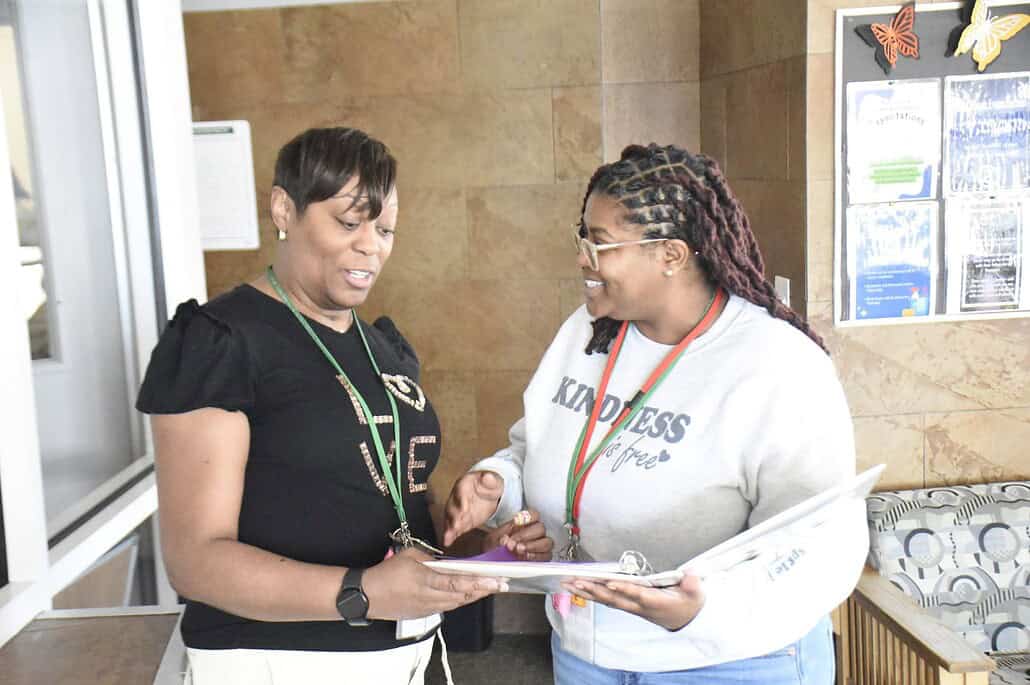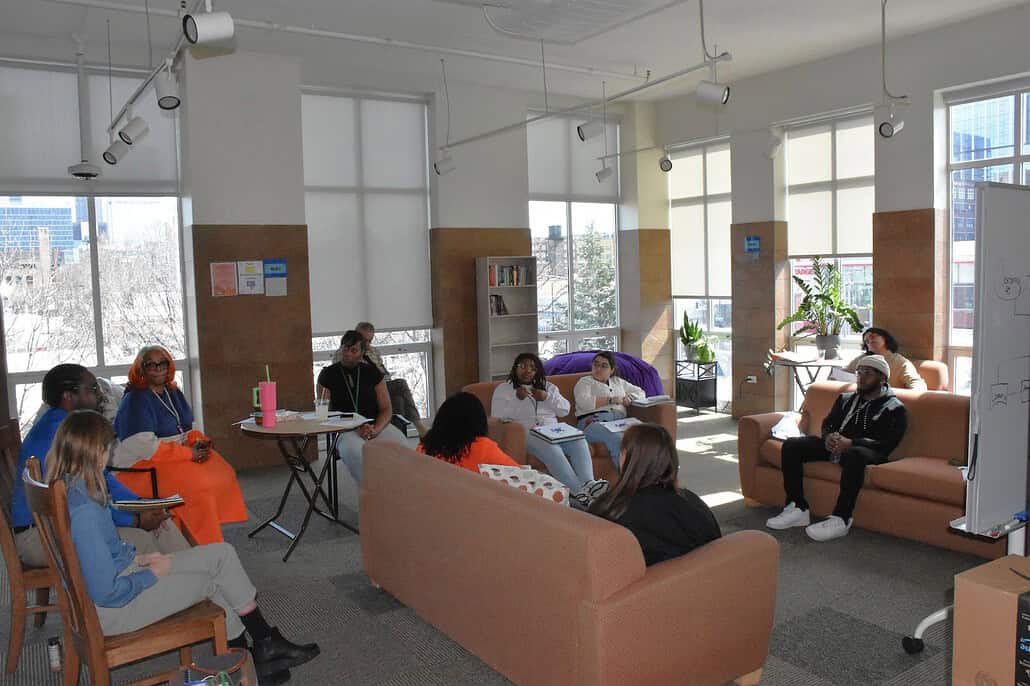Everything Can Be Art
During a rare midweek off day from school, a group of our young people visited the Smart Museum of Art,...
March 26, 2025
March 26, 2025
When Noha Home reopened this January, it looked much different than the Noha Home that closed during the pandemic. Prior to being shuttered due to the COVID-19 emergency that arrived at our door in March 2020, Noha Home served some of the youngest residents on our West Loop Campus, those ages 11 to 14. The newly reopened program now cares for youth ages 16 to 18 years old.
So far, things are off to a strong start. Monica McCaleb, Noha Home program manager, said that young men are adjusting to program expectations, getting enrolled in school, and just getting to know Mercy Home itself. Similarly, the newest coworkers in Noha Home are also adjusting. Nearly all were newly hired by Mercy Home.

“Our staff are [also] getting to know the therapeutic way [that Mercy Home operates],” McCaleb said. “We’re helping them understand how Mercy [operates] as a unit within the Mercy Model. Mercy Home is a unique residential setting.”
That uniqueness is what makes Mercy Home so special—and why, even though Noha Home has changed in some ways, it still operates with the same level of care and excellence as our residential programs always have.
“A difference with Mercy is that we are very patient with our youth,” Joi Basley, Mercy Home’s director of young adult programs, said. “We believe in nonverbal de-escalation, which is part of the CPI [Crisis Development] Model.”
This can be an adjustment for our young people as well. Some may expect punishment for mistakes, because that’s what they’ve experienced in other living situations. But Mercy Home handles things differently.
“[Instead], we’re going to talk about it and see how we can change [challenging behavior] and what we can give you therapeutically to help you through whatever you’re going through,” McCaleb said. “So, it’s getting them to understand and getting them to believe that, that this is how Mercy is run.”
“We allow coworkers to do the same thing, to make mistakes,” Basley added. “My philosophy is always the only way you’re going to learn is if you make mistakes. So, I allow freedom for my team to mistakes. You don’t come into an organization knowing the organization. You bring your skills and expertise into that organization, and you work through a process to meld those things together. I believe in giving grace and feedback for not just the coworkers, but also for the youth.”
Eryka Anderson, the supervisor of youth care in Noha, is one of the new coworkers. She’s been at Mercy Home for about a month and has been encouraged at how things are coming together for both the youth and coworkers within Noha.
“It definitely has been challenging, but also rewarding and beneficial,” she said. “The staff are eager to learn and are open to constructive criticism and figuring out how they can make things better for the youth. It’s been good to see a team that’s trying to find their placement, their footing, and also figuring out how to work together as a team.”

One of Noha Home’s major goals for the youth in their program is to help them develop the life skills they will need to succeed beyond Mercy Home. That includes making sure they graduate from high school, have some kind of post-secondary plan, and learn key skills for living independently, such as budgeting, cooking, cleaning, making healthy meals, personal hygiene, and getting and keeping a job.
Noha also focuses on utilizing a set and predictable structure so that youth know what to expect each day when they are in program. Visual aids are posted throughout the common area that remind the youth and coworkers what each day’s schedule entails, including chores, study time, meals, and more.
The youth, who are currently high school students, have already been hard at work preparing for success past high school during weekly meetings with Marlin Exton, the director of post-secondary options, career resources, and scholarships. They work on important job skills like filling out applications and practicing interviews. The youth were recently able to put their skills to the test at the Job Skills Seminar, and one of the residents even won an award for having the best interview.
As Noha Home prepares to welcome more residents, Basley said that she expects the current youth to step up as leaders to help acclimate newcomers to program.
“When the new youth come into program, they will give them an orientation of what the program is and what is expected,” she said. “I know the staff will definitely give expectations, but I think the youth will be instrumental in enforcing those expectations on the new youth to keep a harmony and peace and to keep the routine going.”
Basley also explained that youth often have a “honeymoon phase” when they first come into program because they are excited to be in a new place and make new friends. Yet eventually, some problematic behaviors can emerge. With the patience and redirection that are part of the Mercy Model, those behaviors often correct themselves.
“[Our approach] absolutely works,” Basley said.
She also explained that part of the work all of our coworkers do with our youth involves planting seeds with the hopes they will come to fruition, even if that happens in their lives post Mercy Home.
“My goal is that when the youth leave these doors, they leave with a sense of understanding and wisdom to what they will be coming up against in the world and that we’ve prepared them for that,” she said.
Though this new iteration of Noha Home is still in its early days, the entire team is excited for what’s to come.
“I’m proud of the team that was chosen to run Noha,” Basley said. “I’m excited to see as they grow and learn from each other, the work they’re going to do. They’re in a stage where they are building and developing, and I think as they continue to do that with open minds, the program trajectory is going to be really good.”
Noha Home was dedicated in 2003 in honor of the late Edward and Marie Noha, longtime supporters of our work and the work of other charities that help children.
We will continue to bring you developments and progress in this program in the future.
Editor’s Note: Living spaces at Mercy Home are divided into several smaller units named after important figures in our organization’s history.
During a rare midweek off day from school, a group of our young people visited the Smart Museum of Art,...
March 26, 2025
Adorning walls throughout Mercy Home for Boys & Girls every February are portraits of African American trailblazers, from activists such...
March 26, 2025
This Martin Luther King Jr. Day, Mercy Home was thrilled to welcome members of Alpha Kappa Alpha Sorority, Inc. Tau...
March 19, 2025
Comments